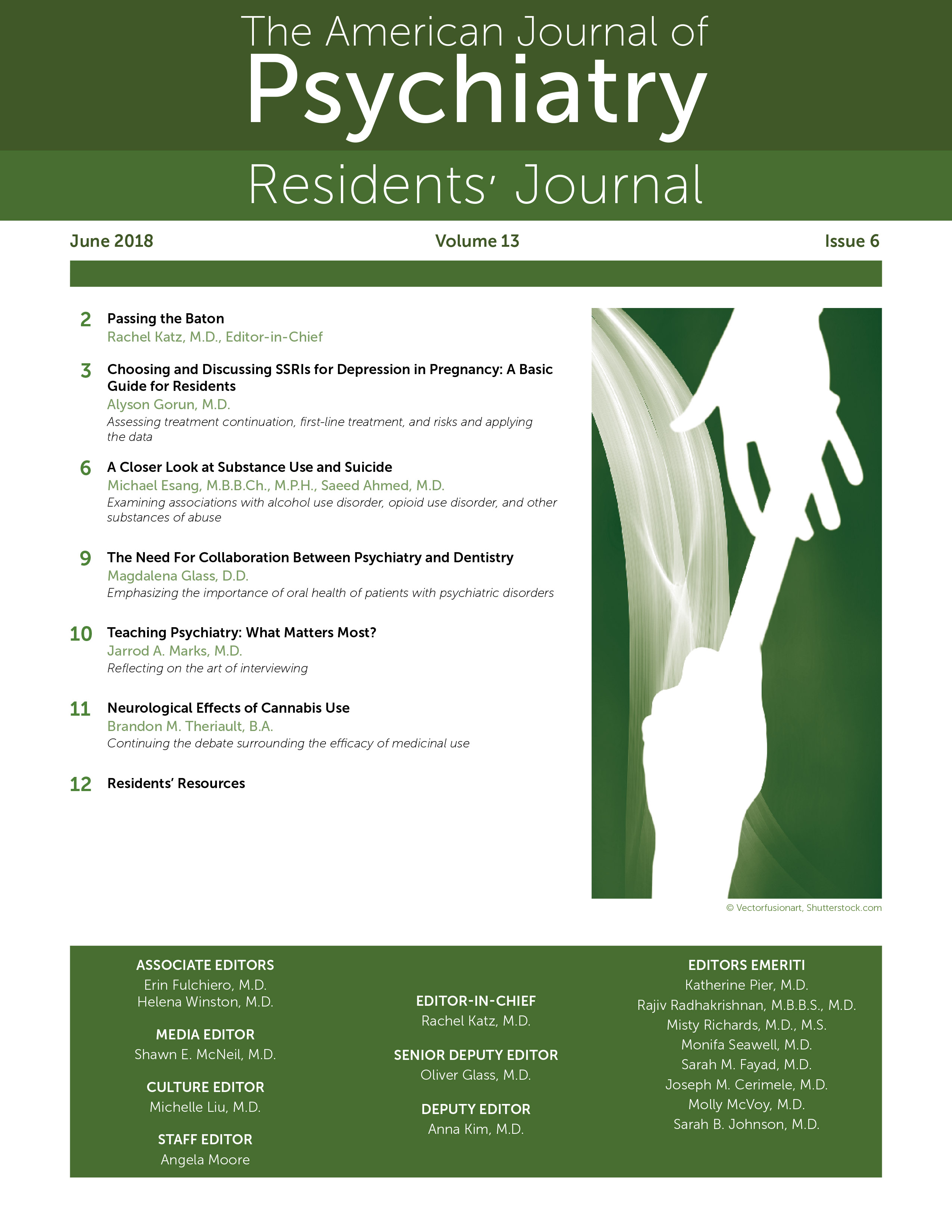The Need For Collaboration Between Psychiatry and Dentistry
Case
"Mr. B" is a 71-year-old Caucasian man with Alzheimer's disease who was brought to the emergency department by staff from his nursing home, because he recently developed agitation with fluctuation in consciousness. In the hospital, he was noted to be hypotensive. Diagnostic workup revealed that he had a urinary tract infection with a significantly elevated white blood cell count. The doctors in the emergency department noted that the patient's breathing was labored. His chest X-ray result was unremarkable. The decision was made to consult internal medicine for admission to the medical floor. The patient's urinary tract infection was treated and eventually resolved, but his fluctuation in consciousness persisted, along with his labored breathing. His agitation began to worsen, and he was placed in restraints. The consultation-liaison psychiatry service was consulted for behavioral management. The psychiatry resident who came to evaluate the patient had recently read about the importance of oral health examinations in patients with mental illness. She asked the patient to open his mouth, where a large oral abscess was discovered. The resident quickly notified the primary care team with the recommendation to involve dentistry. Management recommendations for delirium were also provided.
The above case demonstrates the importance of collaborative care between medical specialties. The psychiatry resident picked up on a medical condition that was likely the main cause of the patient's presentation to the emergency department. If she had been secluded to her specialty, the mental health provider may have simply ordered an as-needed antipsychotic medication to sedate the patient. Additionally, high patient volume and provider fatigue may contribute to a superficial evaluation of patients by some psychiatry residents.
Geriatric patients may encounter a wide array of oral health changes, including (but not limited to) dental avulsion, root caries, periodontal disease, and temporomandibular joint disease (1). Cognitive decline, as is seen in Alzheimer's disease, may affect the patient's ability to identify a particular oral problem. Because agitation in dementia is a serious contributing factor of caregiver burden, institutionalization, mortality, and health care costs, it is imperative that medical specialties cooperate to ensure that an underlying medical issue is not the etiology.
It must be recognized that patients with psychiatric disorders as a whole are especially vulnerable to oral trauma and oral soft-tissue pathologies when compared with healthy subjects (2). Moreover, patients with psychiatric disorders are often prescribed medications that directly affect oral salivary function. For example, anticholinergics are known to cause dry mouth, which is a major factor in the development of dental caries. When a patient abuses an illicit substance, such as methamphetamine or tobacco, it is directly toxic to his or her oral health. Persons with refractory psychosis may be prescribed clozapine, which if uncontrolled may lead to aspiration pneumonia from sialorrhea. Although anticholinergics are a common treatment modality for sialorrhea, these drugs may cause dry mouth and cognitive impairment, which is particularly problematic in older patients.
Patients who visit their psychiatrists often receive an evaluation of their basic vitals, but their oral health care is not routinely explored. The lack of oral health evaluations in patients with psychiatric illness is an area that requires quality improvement. Some may say "that is not my field of expertise," but I say "let us work together."
Key Points/Clinical Pearls
Patients with a psychiatric disorder are especially vulnerable to oral trauma and oral soft-tissue pathologies when compared with healthy subjects.
Psychiatric medications may have properties that increase the risk for developing oral health pathologies, such as dental caries and sialorrhea, which can further lead to poor health outcomes.
Substance abuse can be toxic to oral health, as commonly seen in methamphetamine and tobacco use.
Mental health providers should collaborate with dentistry to ensure optimal health outcomes.
1. : Dental care in late life patients before, during and after ECT (poster). Washington, DC, American Psychiatric Association, 2017. doi: 10.13140/RG.2.2.34793.70247 Google Scholar
2. : Oral health in electroconvulsive therapy: a neglected topic. J ECT 2017; 33:12–15 Crossref, Google Scholar



